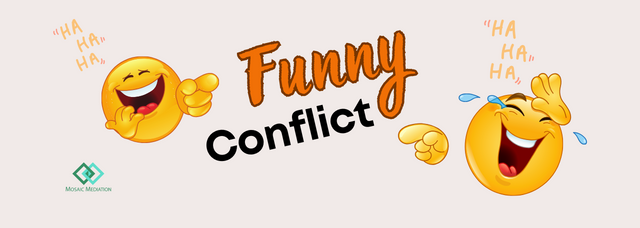The Funny Side of Conflict
Is conflict resolution ever 'enjoyable'?

I have had a lot of experiences with mediation, many of which have been serious, emotional, or awkward. Yet, I have also experienced the lighter side of conflict resolution.
In many a mediation, we have laughed.
In fact, in one recent mediation, there was a whole room of people in full force belly-laughs. Unfortunately, I cannot take credit for cracking the joke that made them laugh to this extent, but I was pleased to be part of a process where people felt able to laugh and joke.
Conflict is so very often avoided because it is uncomfortable and feels painful to endure. That does not sound very funny, does it?
Conflict is also often seen as being very personal. Yet, you can be ‘in conflict’ with someone that you really like. The conflict may, perhaps, not be about the person but about how they work with you or communicate ideas. Conflict, in essence, is not necessarily about disliking someone but having differing perspectives.
Conflict resolution enables people to communicate productively about what those differences are that are creating a disconnect or tension, and exploring how to work in collaboration and communicating in a peaceful manner.
When I first started out as a mediator several years ago, I thought I might need to be serious all the time. Which, as someone who leans more towards optimism than pessimism, felt quite disconnected from who I am in all other scenarios.
It has been a pleasure to discover over the years that mediation does not have to be totally serious, all the time.
Humour is a great way for people to connect on things they both find funny and to release the sense of tension and discomfort. People use humour all the time to deflect from awkward moments. Humour within mediation normally occurs during the human interactions at lunch, or when directly calling out the issue at hand in a light-hearted - yet somehow appropriate - way.
Yes, there are moments when you need to gently handle sensitive topics or difficult dynamics between people. And there are times as the facilitator of the mediation, you need to ensure that topics are covered in a constructive manner, so bring people back to the focus of the conversation and the issues to be addressed.
It is also important for me to note that the humour needs to be respectful and not targeted at people in a way that makes them feel attacked or unsafe. Participants to a mediation should feel able to stop the interaction as soon as it does not feel respectful, and the mediator should be vigilant about noticing body language and facial expressions in response to the joke, so that the room remains a psychologically safe space.
Sometimes uncomfortable truths are shared in a mediation session, but the communication should always be respectful. A professional mediator will often set ground rules during a mediation to ensure that participants know what is expected of them and that, if they are disrespectful to another participant, it will be challenged.
Nevertheless, conflict resolution is not intended to be a formal process but to make the management of conflict feel more informal and ‘human’ than the more common methods of dealing with issues between employees – such as with grievances or disciplinaries.
So, when the common phrase “I can’t believe we got to the point of needing mediation” is uttered, I know that those individuals will be expecting a far more negative experience from mediation than they are likely to get, and that they may conclude with a phrase they really didn’t expect to say – but one I have heard very often too – “I actually enjoyed it”.
Find out more about workplace mediation and other conflict resolution services.
Emma Jenkings is an accredited workplace mediator, conflict coach, interpersonal skills trainer, and DISC Practitioner at Mosaic Mediation. Emma is also a lead facilitator with (2) Bloom Mediator Mentoring: Overview | LinkedIn and Director at CLA Mediation and Training Ltd.










